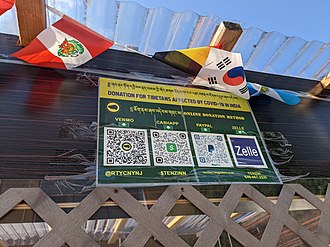Tibetan Americans
Tibetan Americans are Americans of Tibetan ancestry. The history of Tibetans in the United States is relatively recent, with significant migration beginning in the 1950s, after the 1959 Tibetan uprising against the People's Republic of China. Many Tibetans arrived in the U.S. seeking political asylum, religious freedom, and better economic opportunities. The U.S. has become home to a significant Tibetan diaspora, with communities concentrated in cities such as New York City, San Francisco, and Minneapolis.
History
The first significant wave of Tibetan immigrants arrived in the United States after the failed 1959 Tibetan uprising. The Central Intelligence Agency (CIA) played a role in facilitating the escape of some Tibetans to the U.S. during this period. In the decades that followed, more Tibetans fled their homeland due to political persecution and economic hardships, seeking refuge in the United States among other countries.
Demographics
Tibetan Americans are dispersed across the United States, with larger populations in New York, California, and Minnesota. These communities often center around Buddhist temples and monasteries, which play a crucial role in preserving Tibetan culture, religion, and identity. According to the United States Census, the number of people of Tibetan descent in the U.S. has been gradually increasing, reflecting both continued immigration and natural growth.
Culture and Community
Tibetan Americans maintain a strong sense of cultural identity, often through the practice of Buddhism, the celebration of traditional festivals such as Losar (Tibetan New Year), and engagement in political activism related to Tibet's status and human rights issues. Tibetan language and arts are also preserved within the community, with schools and organizations offering classes in Tibetan language, dance, and music.
Political Activism
Many Tibetan Americans are actively involved in the Free Tibet movement, which seeks to bring international attention to the human rights situation in Tibet and to advocate for Tibet's autonomy or independence from China. Organizations such as the Students for a Free Tibet and the Tibetan Youth Congress have chapters in the United States, organizing protests, educational events, and campaigns to support their cause.
Notable Tibetan Americans
Several Tibetan Americans have gained prominence in various fields, including academia, activism, and the arts. Notable individuals include Tenzin Dorjee, a prominent human rights activist, and Yungchen Lhamo, a Grammy-nominated singer known for her traditional Tibetan songs.
Challenges
Tibetan Americans face unique challenges, including navigating their identity between their Tibetan heritage and their American citizenship. Issues such as cultural preservation, political representation, and the struggle for Tibet's recognition on the international stage are central to the Tibetan American experience.
This article is a ethnic-group stub. You can help WikiMD by expanding it!
Transform your life with W8MD's budget GLP-1 injections from $125.
W8MD offers a medical weight loss program to lose weight in Philadelphia. Our physician-supervised medical weight loss provides:
- Most insurances accepted or discounted self-pay rates. We will obtain insurance prior authorizations if needed.
- Generic GLP1 weight loss injections from $125 for the starting dose.
- Also offer prescription weight loss medications including Phentermine, Qsymia, Diethylpropion, Contrave etc.
NYC weight loss doctor appointments
Start your NYC weight loss journey today at our NYC medical weight loss and Philadelphia medical weight loss clinics.
- Call 718-946-5500 to lose weight in NYC or for medical weight loss in Philadelphia 215-676-2334.
- Tags:NYC medical weight loss, Philadelphia lose weight Zepbound NYC, Budget GLP1 weight loss injections, Wegovy Philadelphia, Wegovy NYC, Philadelphia medical weight loss, Brookly weight loss and Wegovy NYC
|
WikiMD's Wellness Encyclopedia |
| Let Food Be Thy Medicine Medicine Thy Food - Hippocrates |
Medical Disclaimer: WikiMD is not a substitute for professional medical advice. The information on WikiMD is provided as an information resource only, may be incorrect, outdated or misleading, and is not to be used or relied on for any diagnostic or treatment purposes. Please consult your health care provider before making any healthcare decisions or for guidance about a specific medical condition. WikiMD expressly disclaims responsibility, and shall have no liability, for any damages, loss, injury, or liability whatsoever suffered as a result of your reliance on the information contained in this site. By visiting this site you agree to the foregoing terms and conditions, which may from time to time be changed or supplemented by WikiMD. If you do not agree to the foregoing terms and conditions, you should not enter or use this site. See full disclaimer.
Credits:Most images are courtesy of Wikimedia commons, and templates, categories Wikipedia, licensed under CC BY SA or similar.
Contributors: Prab R. Tumpati, MD


